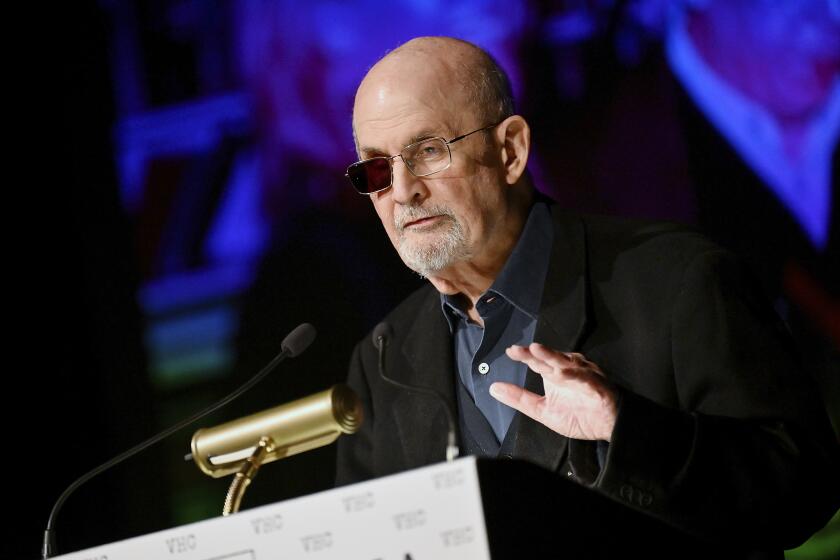Baseball numbers crunched, a life changed in ‘Trading Bases’

For years, Joe Peta was like millions of die-hard baseball fans: a little sappy about his beloved pastime, over-chewing the delicious parts, over-crunching the numbers to a seriously nerdish degree. Then disaster struck, and baseball gave the Stanford MBA more than he’d ever dreamed.
Peta was a successful hedge fund stock trader when an ambulance mowed him down while he was hurrying to his Manhattan office, pretzeling his right leg. Lucky to be alive? Maybe. In short time, he found himself wheelchair bound, 2,500 miles away from his California family and fired from his seven-figure job.
It was the sort of depressive, woe-is-me experience that at first seems like the lowest of luck but turns out to be some sort of life correction. Stuck in his apartment, Peta was soon applying his risk-analysis skills to the world of baseball betting, tallying a Babe Ruthian 41% return in his first year.
“I’m talking about doing research, believing that work creates an edge over others, and then investing in that edge,” he writes. “Why not try to build upon the sabermetric research of Bill James and others and make money by betting on the outcome of baseball games or entire seasons?”
His swaggering story, from frantic stock trader to professional sports bettor, is the basis of “Trading Bases,” an entertaining book about how to turn your passions into profits. Even casual baseball fans could learn from it. Serious fans should slurp it up like ballpark beer.
Using an uncommon facility for numbers, Peta comes up with a model that predicts how a team will perform over a season, based on past player performance and roster upgrades, then spins this into a baseball-centric hedge fund.
As with a baseball game itself, there are certain stretches when you wish it would hurry up a little. Peta’s occasionally wonkish explanations of his risk analysis tricks demand a certain amount of patience.
Indeed, I found myself rereading some of the passages — and cursing his editors — to fully understand what he was saying with such authority. In particular, I struggled to fully process his theory of “cluster luck,” whereby a team’s clutch performances come at just the right time, wreaking havoc with tendencies and trends.
Easier to grasp are his explanations of how he turned full-season projections into single-game picks to take advantage of oddsmakers’ lines.
There are also telling and valuable explanations of baseball’s so-called Pythagorean theorem, in which a team’s winning percentage can be predicted by runs scored and runs allowed.
This isn’t headline news to serious baseball nuts. But such data fortify one of Peta’s most critical premises: that baseball is, for the most part, statistically steadier, providing bettors and fantasy baseball fans with the chance to create models far superior than in most sports.
Throughout, Peta peppers his story with pop culture references, usually relegated to footnotes. Some of these little asides are among the most entertaining tidbits in the book, and I found myself wondering if this casual, chatty information would’ve been even more effective woven into the narrative, including the humble and human: “I traded millions of dollars in stocks without making a math error, and yet I never seem to get out of a bistro in Europe without overpaying for an order of steak frites.”
Obviously, this book goes far beyond baseball. It even pulls back the curtain from the arcane world of investment banking, with insights about Dick Fuld’s overzealous reign at Lehman Brothers, which Peta uses as a reason for his own sense of financial discipline.
He also wonders, smartly, why more businesses aren’t applying the performance-telling statistical models developed for baseball by fleet number crunchers such as Nate Silver.
Mostly though, this book is an ode to the redemptive powers of America’s spring game, a reminder of how the sport can worm its way into your psyche and ultimately reconnect you with the joys of youth.
“It wasn’t just the model, the gambling, or the daily puzzle to be solved in the form of the Vegas line that lifted my spirits, buoyed my recovery, and returned me to the world of sleep-filled nights,” Peta writes. “It was baseball. Baseball, which I’d fallen in love with at age six, still had a grip on me.”
Trading Bases
A Story About Wall Street, Gambling, and Baseball (Not Necessarily in That Order)
Joe Peta
Dutton: 368 pp., $27.95
More to Read
Sign up for our Book Club newsletter
Get the latest news, events and more from the Los Angeles Times Book Club, and help us get L.A. reading and talking.
You may occasionally receive promotional content from the Los Angeles Times.







